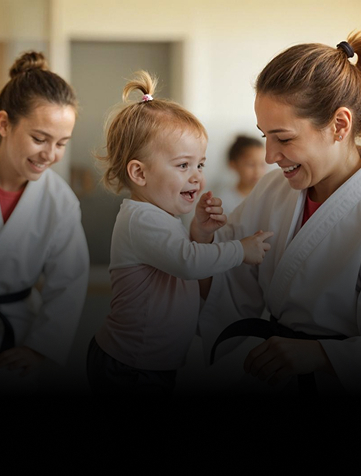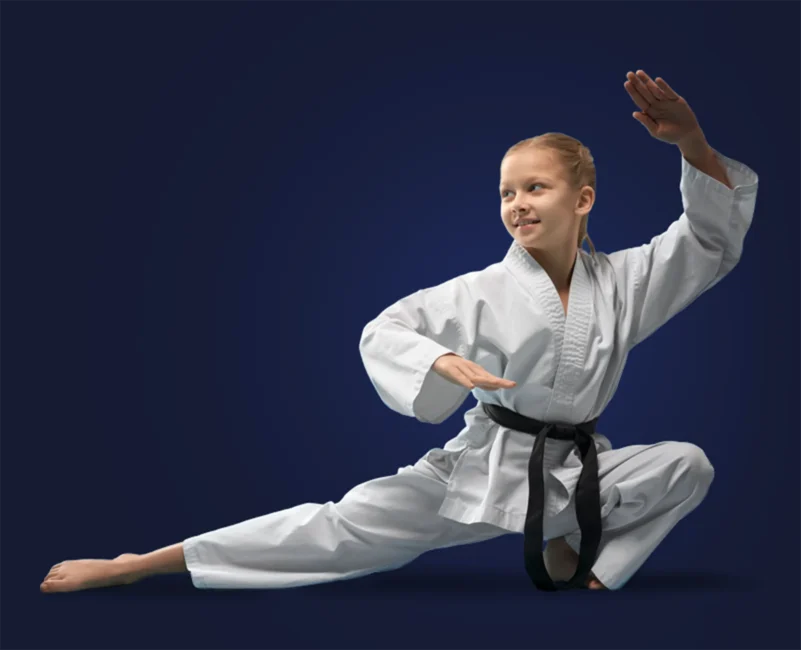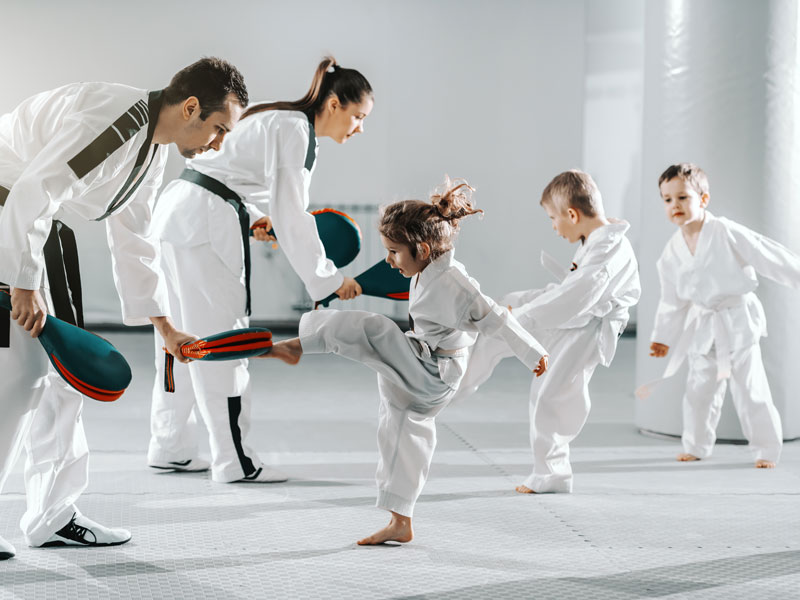Exactly How Martial Arts for Kids Can Increase Confidence and Technique in Young Martial Artists
Karate for youngsters supplies a distinct possibility to build confidence and discipline in young martial musicians. As they find out new methods and face obstacles, they not only acquire abilities but likewise create a strong feeling of self-regard. This structured environment motivates them to appreciate the trip of renovation. But exactly how does this training equate right into their day-to-day lives? Discover the deeper connections that make karate more than just a sport.
The Relevance of Self-confidence in Childhood Years Growth
Confidence is a vital structure block in childhood years growth. When you support your youngster's self-esteem, you equip them to deal with difficulties, take dangers, and reveal themselves easily. Youngsters with self-confidence are extra willing to explore social situations and brand-new tasks, which can lead to long lasting friendships and important experiences.Encouraging your child to get out of their convenience area cultivates durability. They find out that failing isn't the end however rather a tipping rock to success. By commemorating their accomplishments, despite exactly how tiny, you aid them recognize their capacities and worth.In this trip, assistance and positive reinforcement from you play an important role. Whether it's via appreciation or just existing, your involvement enhances their confidence. As they expand, this confidence becomes a long-lasting property, furnishing them to navigate both obstacles and chances with a solid feeling of self.
Exactly How Karate Shows Technique and Emphasis
Karate assists you construct self-control and focus via its organized training regimen. As you exercise mindfulness throughout each session, you'll learn to focus much better both on and off the mat. And also, setting and attaining objectives in karate reinforces your capability to stay fully commited and mindful.
Structured Training Regimen
While you involve in karate training, you'll swiftly discover exactly how a structured program instills self-control and emphasis in young practitioners. Each course follows a certain format, including workouts, technique method, and sparring. This uniformity teaches you to appreciate the procedure and commit to enhancement. As you learn forms and strategies, you develop a feeling of duty for your own progress.The organized setting encourages you to establish objectives, whether mastering a new belt or improving a kata. You'll find that remaining focused during courses and drills sharpens your concentration. The self-control you grow in martial arts prolongs past the dojo, favorably impacting your schoolwork and daily routines. Each session strengthens the relevance of dedication, aiding you expand into a more regimented individual.
Mindfulness in Method
As you exercise martial arts, you'll locate that mindfulness becomes a crucial part of your training. Each move requires your full attention, helping you stay concentrated on today minute. You'll find out to disregard distractions and concentrate on your breathing, movements, and intentions. This heightened understanding hones your reflexes and improves your discipline.During sparring or types, you'll find the significance of being psychologically present - Karate Salisbury MD. You'll discover how this focus not only enhances your technique but also constructs your self-confidence. By exercising mindfulness in martial arts, you grow perseverance and durability, crucial attributes that expand beyond the dojo. This way, karate teaches you to harness your mind, helping you create a disciplined strategy to obstacles both on and off the floor covering

Personal Goal Setting Techniques
Establishing goals in martial arts isn't just regarding earning belts; it's a powerful means to cultivate self-control and emphasis. When you set details, attainable targets, you develop a roadmap for your progress. Rather of simply aiming to enhance your kicks, attempt focusing on mastering a specific method each month. This strategy keeps you inspired and engaged.Breaking down bigger objectives into smaller, workable actions helps you track your progression and celebrate little triumphes in the process. Whether it's improving your position or increasing your sparring endurance, every goal strengthens your commitment. As you attain these objectives, you'll build confidence in your skills and establish a solid feeling of technique that extends past the dojo right into day-to-day life.
Building Resilience With Martial Arts
Martial arts, especially martial arts, offers kids a special possibility to construct strength in an encouraging setting. In courses, they encounter challenges that push their limitations, whether it's grasping a brand-new method or sparring with a companion. Each obstacle, like a missed out on kick or a shed match, ends up being a possibility to learn and grow.As they practice, kids learn to embrace discomfort and maintain attempting, also when points get difficult. They discover that failure isn't the end; it becomes part of the trip. This mindset helps them jump back more powerful, not just in the dojo, but in day-to-day life.With each challenge they overcome, your youngster constructs self-confidence in their ability to tackle barriers, fueling their determination. With karate, they'll understand that strength isn't almost physical strength; it's concerning mental grit and perseverance, encouraging them to face whatever life tosses their method.
The Role of Regard in Karate Educating
Regard is a foundational concept in karate training, promoting a culture of technique and friendship among pupils. When you step onto the dojo flooring, you're not just finding out methods; you're also finding out to appreciate your instructors, peers, and the art itself (Karate Salisbury MD). Bowing at the start and end of class isn't simply a formality; it represents your recommendation of others' dedication.as and initiatives you create mutual regard, you'll discover it enhances your understanding experience. You'll pay attention a lot more attentively to your trainer and gain understandings from fellow trainees. This setting encourages useful objection and support, permitting everyone to expand together.Moreover, regard cultivates self-control. Recognizing the value of tough work and humility assists you remain focused on your training. Consequently, this regard translates into your daily life, improving your interactions and partnerships outside the dojo. Through karate, you discover that regard is vital for individual development and community building
Achieving and setting objectives Success in Martial arts

Social Abilities and Synergy in the Dojo
While training in the dojo, youngsters naturally develop important social skills and synergy capacities. As they practice alongside peers, they find out to connect successfully, share area, and support each other. Each course provides opportunities for collaboration, whether it's during partner drills or group workouts. This synergy cultivates relationships and creates a feeling of belonging, making the dojo a nurturing environment.Kids also obtain beneficial dispute resolution skills. When they run into difficulties, such as disputes throughout sparring, they discover to navigate these circumstances constructively. They practice perseverance and empathy, understanding that every person has different toughness and weaknesses.Moreover, joining group tasks grows a sense of accountability. You'll see your youngster discovering to count on teammates and take responsibility for their function in a group. These experiences not only enhance their fighting styles journey however also furnish them with social devices they'll carry into various other areas of life.

The Long-Term Advantages of Martial Arts Beyond Childhood Years
As youngsters mature and shift right into adulthood, the benefits of karate expand far beyond the dojo. You'll discover that the technique and focus learned with martial arts can translate into your academic and specialist life. Setting and accomplishing objectives in fighting styles cultivates a strong work principles, which can press you to succeed in any kind of endeavor.Moreover, the confidence acquired from grasping methods and competing can boost your self-esteem, helping you deal with difficulties head-on. This durability comes to be very useful as you face the uncertainties of adulthood.Additionally, the social skills developed through teamwork and camaraderie in the dojo can result in much better connections in both personal and expert spheres. You'll learn to connect effectively, resolve conflicts, and construct an encouraging network.Ultimately, karate forms not simply knowledgeable martial musicians, yet all-round people ready to take on the world.
Regularly Asked Inquiries
What Age Is Finest to Begin Karate for Kids?
You can read this post here begin martial arts as early as age four or 5, however it commonly depends upon your child's maturity and passion. Discovering a class that matches their age and power level makes a large distinction.
Are There Any Wellness Perks From Practicing Karate?
Yes, exercising karate offers numerous wellness benefits. You'll improve your toughness, sychronisation, and flexibility while boosting cardio fitness. And also, it enhances emphasis and mental health, making it a great selection for general physical and psychological health.
Just How Frequently Should Children Attend Martial Arts Classes?
You must encourage your youngsters to participate in karate classes a minimum of two to three times a week. Uniformity helps them discover strategies efficiently and create skills, making their experience much more fulfilling and pleasurable in the long run.
Can Karate Aid With Managing Stress And Anxiety in Kid?
Yes, karate can assist take care of anxiety in kids. It shows emphasis and self-control while supplying a secure outlet for energy. You'll discover your kid expanding extra calm and positive as they exercise routinely.
What Gear Is Needed for Children Beginning Martial Arts?

Comments on “Martial Arts for Kids – Boost Self-Esteem and Focus with Each Session”